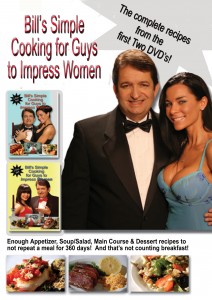In the film Field of Dreams, Kevin Costner’s character, Ray Kinsella, talks about his relationship with his father. He says that no matter what was wrong between them, they always had Baseball in common. I love baseball and when I was in elementary school, playing Little League Baseball was all-consuming. Yet, instead of baseball as in Field of Dreams, for my father and me, the sport that bound us was Golf.
I don’t recall if I mentioned this before, but my father grew up in Belleville, Illinois. One of his childhood friends was Bob Goalby, who won the 1968 Masters and ten other PGA tour events. My father had early desires to join the professional tour, but chose instead to marry and raise a family. He then set his desires upon me becoming a tour player. This caused friction between us for the formative years of my adolescence.
 I played a round of golf with him at a Pitch and Putt course when I was less than 10 years old, but I recall very little of it. I wasn’t that impressed with trying to whack a ball around that day and I didn’t take the game more seriously until age 14. I’d heard rumors that there was going to be a freshman golf team. I hit some balls on the driving range a couple of times and then, at age 15, I joined my 9th grade golf team. We were such a small school and the idea of a golf team was so new to our school that there were no tryouts. You want to be on the team? You’re on the team.
I played a round of golf with him at a Pitch and Putt course when I was less than 10 years old, but I recall very little of it. I wasn’t that impressed with trying to whack a ball around that day and I didn’t take the game more seriously until age 14. I’d heard rumors that there was going to be a freshman golf team. I hit some balls on the driving range a couple of times and then, at age 15, I joined my 9th grade golf team. We were such a small school and the idea of a golf team was so new to our school that there were no tryouts. You want to be on the team? You’re on the team.
My dad came and walked along with me for my first round of golf. I played that day with boys who would become life-long friends. I shot 72 that day. I’ll always remember that. But before you think I was some sort of prodigy, I’ll confess here that we only played nine holes. The par on that course was 72. The par on the front nine was 37 so I almost doubled par.

I spent more time in the trees than a pine cone.
I sucked.
I hoovered so badly that, despite my father being with me, my (not-quite-yet) friend Mark told my friend Rick that they should just keep playing and not wait for me anymore. It would have been a very rude thing to do, but I spent more time in the trees that day than a pine cone. Mark was so frustrated with having to wait for me to find my ball, then chunk it a few more yards, he didn’t even care about a breach of etiquette.
Everyone survived my first round and I kept trying. I hacked away five days a week, after school, for the second semester of my freshman year. On weekends, I played at another course where my father was a member. Early on, before I was even ten, I’d get to go with him on a Saturday or Sunday morning. I got to walk along and pull his two-wheeled hand cart and he told me I was his caddy. This almost-weekly event was sometimes questioned by other siblings. Why does Billy always get to go with Daddy? It was one of the perks of being the first born, but, I later figured out, it was because my dad wanted me to live the dream he no longer could.
When I turned 16-years-old, I was eligible to become a Junior Member of the golf course and get to play on weekends. Those were glorious times for me. I was growing up and learning to be a man. I’m not saying that all of the things I learned served me well, but those were foundational years. For me, one of the signs that I was growing, both as a person and a golfer, was when the pro began pairing me with groups other than the foursome in which my father played. One Sunday I played with a husband and wife. Their name was Petersen and we teed off on the back nine first, while the regular Men’s Club took the front nine. I shot 99 that day. It wasn’t more than a year after I’d begun playing and I remember Mr. Petersen telling my dad, “Your boy shot 99 today.”
My dad was proud, but even more so when some of the better and more respected players stopped him and said, “I heard your boy shot 99 today!” When I observed from a distance, one of those men, Mr. Graham, saying this to my dad, I first thought, “Well I’m the one who played the round!” But I realized that Mr. Graham was acknowledging my father’s part in bringing me into the game. My dad had spent hours with me on the range and on the course. He’d brought me with him all those previous years so the game and its etiquette could begin to sink in. Now he bought me equipment, paid for lessons from our club pro and paid my greens fees. My milestone of breaking 100 for the first time was as much a milestone for him as for me. Mr. Graham was acknowledging my father’s milestone and success, too.
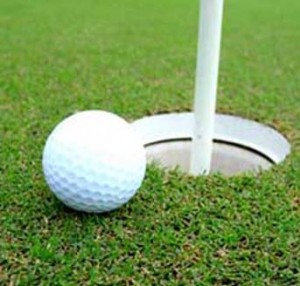 I can vividly remember my father next telling me that my goal was to bogey every hole. If I did that, I’d shoot 90. He told me to try to get onto each green in one shot more than regulation, then two-putt. If I got close enough to the hole with my approach, I could one-putt and be ahead of my goal. If I hit the green in regulation and two-putted, I’d be another shot ahead of my goal to break 90.
I can vividly remember my father next telling me that my goal was to bogey every hole. If I did that, I’d shoot 90. He told me to try to get onto each green in one shot more than regulation, then two-putt. If I got close enough to the hole with my approach, I could one-putt and be ahead of my goal. If I hit the green in regulation and two-putted, I’d be another shot ahead of my goal to break 90.
I recall the first time I shot 44. I played an afternoon round with the assistant pro. He left me to my game and didn’t offer any advice. But I knew he was a pro and I concentrated more on what I was doing. It was one of those early examples of work (or play) with someone who is better and you’ll do better. I had eight bogies and one par. Hadn’t quite done it for 18 holes, but it was the first time I’d “beaten bogie” on a round.
Memories of my youth seem to all revolve around golf. I remember my first birdie… my second and third one, too! I remember the first time my dad and the others said, “If you’re going to play with us, you play from the blue tees.” I remember the first time I was invited to play with the single-digit-handicap players. In fact, I played with Mr. Graham and his group that day.
Mr. Graham had talked with our club pro and told him to put me into his foursome. I was the fifth player in the group and Mr. Graham had told the pro that he’d make sure we didn’t slow anyone down. I nearly ran to my father that morning to tell him I’d been placed with the serious golfers. My dad said, “Just play within your own game. They’ll have bets, but don’t concern yourself with them. No matter which of their two-man teams has the honor, they’ll have you tee off third. Remember your manners.” And he patted my arm and left me to go be a man.
I was probably only 17 years old at the time, but I felt like an adult. I was probably playing then to about a 12 to 14 handicap. The second hole was one on which I had a lot of difficulty. There was a tight out-of-bounds on the left and a stream cut across the fairway right about where my drive usually landed. The hole was a par four and I didn’t want to lay up, as I wouldn’t be able to make the green with my second shot. The first two men teed off then I stood on the tee. I heard my dad’s advice to play within my own game but I wanted to hit a good drive and be on the other side of the stream like these good players. I hit it out to the right, the shortest distance over the stream and cleared it. I gulped and tried to show no emotion. The men all said, “Good shot, Billy.” On the far side of the stream I found my ball in the fairway, right up there with the rest of them. I selected a four iron and hit it about ten feet from the pin. The men again simply commented, “Good shot…”
I was second closest to the hole and had to wait for three other men to putt first. To this point in my young life, I’d only made three birdies and my heart began to thump. I began to talk to myself. Just roll this one. Calm down. Don’t hit it too hard. Don’t hit it too soft. JUST BE CALM! I mean, just be calm…
I rolled it right into the heart of the cup.
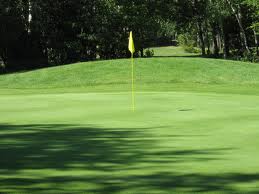 All four of the men burst into cheers and laughter, each patting me on the back as I made my way to the hole to get my ball. As the last man lined up his putt, Mr. Graham whispered to me, “Great hole. You made it look easy.”
All four of the men burst into cheers and laughter, each patting me on the back as I made my way to the hole to get my ball. As the last man lined up his putt, Mr. Graham whispered to me, “Great hole. You made it look easy.”
“I’ve only made three birdies in my life,” I half choked. He looked at me and smiled.
“Won’t be the last,” he said and placed his arm on my shoulder.
The last man to putt lipped out and I realized I’d made the only birdie and had just beaten them all on this hole. It was as if I’d been let into a club. Or, perhaps, I’d earned my way into a club. The other three men, who’d been a little aloof for the first two holes, began talking freely with me and treating me as if I were part of the group. Even though I’d had the low score on the hole, I teed off in the middle on the third tee. And I hit a good drive!
 They rode electric carts and I carried my bag. Arriving at my ball, Mr. Graham pulled his cart to a stop beside me. My father had taught me to think about my next shot before arriving at my ball. He explained that it would help speed up play, but it would also help my game by making me think of the game and different ways to approach a shot. I’d already selected my club and decided how I wanted to hit my shot. Mr. Graham got out of his cart and picked up my golf bag. He stuffed it between the other two bags on the back of his cart.
They rode electric carts and I carried my bag. Arriving at my ball, Mr. Graham pulled his cart to a stop beside me. My father had taught me to think about my next shot before arriving at my ball. He explained that it would help speed up play, but it would also help my game by making me think of the game and different ways to approach a shot. I’d already selected my club and decided how I wanted to hit my shot. Mr. Graham got out of his cart and picked up my golf bag. He stuffed it between the other two bags on the back of his cart.
“We can’t give you a ride, but we can carry your bag!”
“Thank you, sir,” I said.
“How are you going to hit this shot?”
“Uhh… I’m going to aim just to the green side of the right trap and draw it back.”
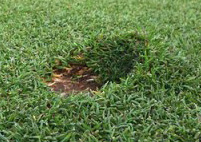 Mr. Graham nodded. I didn’t realize it at the time, but he asked me the question to see where my mind was, whether I was playing golf, or just hitting a ball around. Another man hit and it was my turn. I hit the ball in the direction I intended but I caught it a bit heavy and it landed short of the trap. I kept my cool and replaced my divot and put my club into my bag.
Mr. Graham nodded. I didn’t realize it at the time, but he asked me the question to see where my mind was, whether I was playing golf, or just hitting a ball around. Another man hit and it was my turn. I hit the ball in the direction I intended but I caught it a bit heavy and it landed short of the trap. I kept my cool and replaced my divot and put my club into my bag.
 “Watch my partner there.” The gentleman hit his shot. “Did you see how he pulls his hands down and lets his wrists uncock at the bottom of his swing?
“Watch my partner there.” The gentleman hit his shot. “Did you see how he pulls his hands down and lets his wrists uncock at the bottom of his swing?
“No, sir. I didn’t notice that.”
“It makes for a more crisp contact with the ball. Watch him on the next tee…” He pulled forward to go to his shot and I walked behind.
I’d started my swing with my wrists first. It’s called casting and that’s why I’d hit my shot fat. Mr. Graham didn’t tell me what I’d done wrong, or even that I’d done something wrong. But by having me watch the other man, he was pointing out the correct way to fix my error and I’m not even sure I was aware he was talking about my swing. He just pointed out something another and much better player was doing correctly and left me to make the connection.
 This happened throughout the round. He took time to explain nuances of the game I hadn’t yet considered. Of course, there were several holes where I didn’t play so well, but I didn’t embarrass myself that day. And that round of golf was pivotal in my youth. I was accepted by these men as a golfer. I played on my own without being with my father and I embarked on the first of many rounds with the men’s club at our golf course, the first of many rounds where I learned to love the game and learned to be an adult.
This happened throughout the round. He took time to explain nuances of the game I hadn’t yet considered. Of course, there were several holes where I didn’t play so well, but I didn’t embarrass myself that day. And that round of golf was pivotal in my youth. I was accepted by these men as a golfer. I played on my own without being with my father and I embarked on the first of many rounds with the men’s club at our golf course, the first of many rounds where I learned to love the game and learned to be an adult.
Looking back on that round after years of life, it feels like my father sent out a teenager to play golf and I returned as a young man.
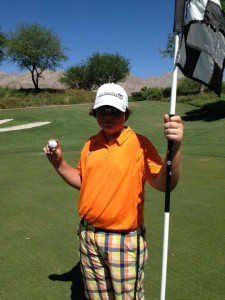 Recently I saw a FaceBook post from my friend, Gabe. His youngest son Nick had completed his first round under par. There was a picture of Nick holding the flag stick and the ball he’d just putted. I talked with Gabe about it and he said that Nick had made eight pars and birdied number nine. Sweet.
Recently I saw a FaceBook post from my friend, Gabe. His youngest son Nick had completed his first round under par. There was a picture of Nick holding the flag stick and the ball he’d just putted. I talked with Gabe about it and he said that Nick had made eight pars and birdied number nine. Sweet.
There was another picture of Nick standing next to Gabe. The caption was about the golfer (Nick) and his caddy (Gabe). That picture speaks volumes to me. The expression of pride on Gabe’s face nearly overshadows everything else. I looked beyond Gabe’s expression and saw within that picture the passing of a torch, the passing of what will become in Nick’s life, the love of the greatest game ever invented. And it was being handed down to him by his father, just as it had been handed to Gabe by his father, just as it had been handed to me by my father.
You can’t impart this love, you can’t make it happen. You can only expose your child to the game and join him in the playing and let the love evolve.
Golf is a game you can’t win. You can only play. To say golf is a metaphor for life, in my opinion, is the quintessential understatement. Just when you think you’ve got a handle on the game, it will tear you down and show you that you don’t really know anything. Then she will gently and lovingly bring you back to the top. Golf always tests your mental abilities, your creativity, your testicular fortitude and your confidence.
Whenever I was not progressing in the game to my father’s expectations, he’d say, “You’ve got all the tools, what’s wrong?” I can’t tell you how many times he asked me that. I can hear his voice saying it to me right now. I wasn’t aware of it at the time, but the answer is that I never believed in myself.
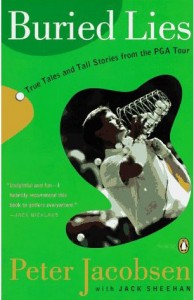 Peter Jacobsen wrote a wonderful book about golf and his life. (You can’t write a book about golf without it being about life.) In the book, Buried Lies, Jake talks about a time when he was struggling with his putting. He went to a teaching pro who took him out to the practice putting green. He had Jake stand about ten feet from one of the cups.
Peter Jacobsen wrote a wonderful book about golf and his life. (You can’t write a book about golf without it being about life.) In the book, Buried Lies, Jake talks about a time when he was struggling with his putting. He went to a teaching pro who took him out to the practice putting green. He had Jake stand about ten feet from one of the cups.
“Hit a putt,” the pro said.
“I don’t have a ball,” Jake lamented.
“Putt an imaginary ball.” Jake did. The pro asked him, “Did it go in?”
“Well, yeah!” Jake responded.
“Good,” said the pro. “If it hadn’t, I wouldn’t be able to help you.”
As I was reading this passage, I also stroked an imaginary putt. Mine didn’t go in. This was many years later in my life when I only played once a month or so with friends. But it glaringly pointed out why I’d never been more successful at golf, or anything else. I never believed in myself. I almost always saw myself as failing. I never had any confidence in my abilities both on and off the course, in any aspect of my life.
 There are always jokes about “conducting business” on a golf course. Those who haven’t don’t realize what can be learned on a golf course. How you play golf is how you manage your life. You can learn more about a person’s character on the golf course than you will in months of business meetings and dealing.
There are always jokes about “conducting business” on a golf course. Those who haven’t don’t realize what can be learned on a golf course. How you play golf is how you manage your life. You can learn more about a person’s character on the golf course than you will in months of business meetings and dealing.
Golf is about life.
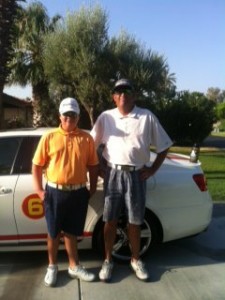 In this picture, you can see all of that in Gabe’s face. He knows the game will challenge his young son. He knows the joys and heartaches it can bring. And he knows the character it will build in Nick’s life. In this picture I see his love of the game and the gift that was given to Gabe by his father, being passed down to his son. And, whether he is conscious of it or not, this knowledge beams from his face.
In this picture, you can see all of that in Gabe’s face. He knows the game will challenge his young son. He knows the joys and heartaches it can bring. And he knows the character it will build in Nick’s life. In this picture I see his love of the game and the gift that was given to Gabe by his father, being passed down to his son. And, whether he is conscious of it or not, this knowledge beams from his face.
I can see it. I can see it and it evokes deep feelings of gratitude for the game my father passed down to me. Whether I failed at golf as I have failed at many things in my life, whether my father and I fought and struggled over how I played, I do love the game and am forever grateful he taught it to me. I am grateful for all of the times we had, whether good or bad. It is something we shared. Golf kept us connected in our toughest times and brought a warmth of mutual understanding in his later years. It is something that only a golfer knows. We knew the frustration of a poorly executed shot or a bad break. We felt the elation of the others’ good shot. We knew the resonating feeling of purity in our body after a well-struck shot and when he connected with the ball, I felt it. And vice versa. But more than a shared experience, it was time that we shared, living life… living life together. Golf was the medium through which we bonded.
Thanks for posting that pic, Gabe. Best of luck to you, Nick! May you enjoy the gift you’ve been given. And congratulations to both of you on Nick’s first round under par!


